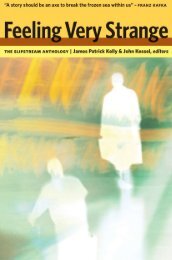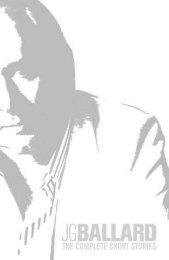The Curse of the Wer.. - Site de Thomas - Free
The Curse of the Wer.. - Site de Thomas - Free
The Curse of the Wer.. - Site de Thomas - Free
Create successful ePaper yourself
Turn your PDF publications into a flip-book with our unique Google optimized e-Paper software.
40 THE CURSE OF THE WEREWOLF<br />
to advance notions <strong>of</strong> <strong>the</strong> inexorable progress <strong>of</strong> civilization, it also<br />
implied <strong>the</strong> possibility <strong>of</strong> <strong>de</strong>generacy, or atavism; if humanity had<br />
evolved from <strong>the</strong> animal kingdom, it was conceivable that it could<br />
regress in <strong>the</strong> same direction. Certainly, Charles Darwin himself had<br />
presaged such an interpretation <strong>of</strong> his i<strong>de</strong>as, when he wrote that certain<br />
actions, such as ‘<strong>the</strong> bristling <strong>of</strong> hair un<strong>de</strong>r <strong>the</strong> influence <strong>of</strong> extreme<br />
terror, or <strong>the</strong> uncovering <strong>of</strong> <strong>the</strong> teeth un<strong>de</strong>r that <strong>of</strong> furious rage’ should<br />
be un<strong>de</strong>rstood ‘on <strong>the</strong> belief that man once existed in a much lower<br />
and animal-like condition [sic].’ 91 Writers on <strong>the</strong> subject <strong>of</strong> lycanthropy<br />
were quick to recognize <strong>the</strong> implications <strong>of</strong> such statements. <strong>The</strong><br />
overarching i<strong>de</strong>a in Fiske’s essay, for example, is <strong>the</strong> notion that <strong>the</strong><br />
werewolf myth might be explained in terms <strong>of</strong> <strong>de</strong>generation <strong>the</strong>ory.<br />
In this sense, <strong>the</strong> focus on science remained strong in <strong>the</strong> late nineteenth<br />
century, but it was a haunted science, <strong>the</strong> science <strong>of</strong> <strong>de</strong>generation<br />
<strong>the</strong>orists, <strong>of</strong> spiritualists and occultists, and, increasingly, scientists<br />
<strong>of</strong> <strong>the</strong> human psyche. Meanwhile, a resurgent Gothic literature was<br />
equally obsessed with <strong>the</strong> discourses <strong>of</strong> science. As Kelly Hurley has<br />
observed, ‘<strong>the</strong> end-<strong>of</strong>-century Gothic is a genre thoroughly imbricated<br />
with biology and social medicine’, 92 and o<strong>the</strong>r critics have noted <strong>the</strong><br />
particular significance <strong>of</strong> Gothic to <strong>the</strong> <strong>de</strong>velopment <strong>of</strong> psychiatry<br />
in <strong>the</strong> twentieth century. 93 Sigmund Freud was certainly alert to <strong>the</strong><br />
convergences between Gothic and scientific traditions in his work,<br />
writing that ‘<strong>the</strong> poets and philosophers before me discovered <strong>the</strong><br />
unconscious. What I discovered was <strong>the</strong> scientific method by which<br />
<strong>the</strong> unconscious can be studied.’ 94 And fur<strong>the</strong>r: ‘it strikes me myself<br />
as strange that <strong>the</strong> case histories I write should read like short stories<br />
and that, as one might say, <strong>the</strong>y lack <strong>the</strong> serious stamp <strong>of</strong> science.’ 95<br />
Certainly, Freud’s ‘cases’ resonated with <strong>the</strong> ‘cases’ <strong>of</strong> <strong>the</strong> fictional<br />
<strong>de</strong>tectives who flourished contemporaneously in <strong>the</strong> hands <strong>of</strong> writers<br />
such as Conan Doyle.<br />
<strong>The</strong> figure <strong>of</strong> <strong>the</strong> <strong>de</strong>tective emerged from <strong>the</strong> fin <strong>de</strong> siècle Gothic<br />
tradition, with its focus on <strong>the</strong> boundaries between <strong>the</strong> known and <strong>the</strong><br />
unknown; according to Hurley, fin <strong>de</strong> siècle Gothic was populated by<br />
‘scientist-protagonists (doctors, psychologists, chemists, anthropologists,<br />
natural historians) … hesitating between scientific and occultist





